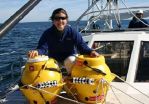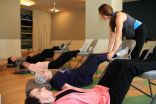Syracuse biologist reveals how whales may 'sing' for their supper
Syracuse University Professor Susan Parks publishes story on acoustic communication in 'Scientific Reports'
2014-12-16
(Press-News.org) Humpback whales have a trick or two, when it comes to finding a quick snack at the bottom of the ocean. But how they pinpoint that meal at night, with little or no available light, remains a mystery.
Susan Parks, assistant professor of Biology in Syracuse University's College of Arts and Sciences, in collaboration with a consortium of other researchers, has been studying these unique feeding behaviors. Her research emphasizes the importance of specific auditory cues that these mammoth creatures emit, as they search the deep ocean for their prey.
Her findings are the subject of an article in the December issue of Scientific Reports (Evidence for acoustic communication among bottom foraging humpback whales, 2014), co-authored by researchers at Moss Landing Marine Laboratories, Oregon State University, Gerry E. Studds Stellwagen Bank National Marine Sanctuary, and the Whale Center of New England.
"Humpback whales are known to cooperate with others to corral prey near the surface," says Parks, who studies marine science and acoustic communication. "Recent studies suggest they may cooperate [with each other], when feeding on bottom prey, as well."
Parks was part of a collaborative multi-institutional consortium that has spent a decade monitoring Humpback feeding behaviors in the Gerry E. Studds Stellwagen Bank National Marine Sanctuary, off the coast of Massachusetts. Whales were tagged with special underwater recording devices so Parks could determine how specific acoustic sounds correlated with successful seafloor feeding.
The investigation revealed that whales make "tick-tock" noises while hunting together at night in deep, pitch-black water, but are silent when hunting alone.
On the menu? Mostly sand lance--eel-like fish known to bury themselves in the sand of the ocean floor. Parks suggests that whales' vocal sounds may help flush the sand lance out of hiding to where they're scooped up and eaten.
The clock-like sounds created by whales may also serve as a dinner bell of sorts for other nearby whales during late-night feedings.
"Hints of behavior suggest that other whales who overhear the sounds are attracted to them and may eavesdrop on other whales hunting for food," Parks adds.
INFORMATION:
Prior to joining Syracuse's faculty in 2011, Parks held various appointments at The Pennsylvania State University, Cornell University, and the Woods Hole Oceanographic Institution. She is the recipient of numerous honors and awards, including the Presidential Early Career Award for Scientists and Engineers, the U.S. government's highest honor for scientists and engineers.
[Attachments] See images for this press release:

ELSE PRESS RELEASES FROM THIS DATE:
2014-12-16
Massachusetts General Hospital (MGH) investigators have developed a method of detecting, across the entire genome of human cells, unwanted DNA breaks induced by use of the popular gene-editing tools called CRISPR-Cas RNA-guided nucleases (RGNs). Members of the same team that first described these off-target effects in human cells describe their new platform, called Genome-wide Unbiased Indentification of DSBs Evaluated by Sequencing (GUIDE-seq), in a report being published online in Nature Biotechnology.
"GUIDE-seq is the first genome-wide method of sensitively detecting ...
2014-12-16
ANN ARBOR--A national survey of students in U.S. middle schools and high schools shows some important improvements in levels of substance use.
Both alcohol and cigarette use in 2014 are at their lowest points since the study began in 1975. Use of a number of illicit drugs also show declines this year.
These findings come from the University of Michigan's Monitoring the Future study, which tracks trends in substance use among students in 8th, 10th and 12th grades. Each year the national study, now in its 40th year, surveys 40,000 to 50,000 students in about 400 secondary ...
2014-12-16
The rate at which carbon emissions warmed Earth's climate almost 56 million years ago resembles modern, human-caused global warming much more than previously believed, but involved two pulses of carbon to the atmosphere, researchers have found.
The findings mean that the so-called Paleocene-Eocene thermal maximum, or PETM, can provide clues to the future of modern climate change.
The good news: Earth and most species survived.
The bad news: It took millennia to recover from the episode, when temperatures rose by 5 to 8 degrees Celsius (9 to 15 degrees Fahrenheit). ...
2014-12-16
Researchers at Columbia University's Mailman School of Public Health analyzed the results of the Oregon Health Experiment, where eligible uninsured individuals were randomly assigned Medicaid or to stay with their current care. Considered controversial because the experiment found no measurable gains for physical health it did reveal benefits for mental health, financial wellbeing, and preventive screening. In terms of quality-adjusted life years, the researchers showed that Medicaid is an excellent value--a $62,000 gain in quality-adjusted life years. Study findings are ...
2014-12-16
Antimicrobial peptides are a distinctive class of potent, broad-spectrum antibiotics produced by the body's innate immune system--the first line of defense against disease-causing microbes.
In a new study, Yixin Shi, Ph.D., and Wei Kong, Ph.D., researchers in the Center for Infectious Diseases and Vaccinology at Arizona State University's Biodesign Institute, explore the clever techniques used by bacteria to survive destruction from antimicrobial peptides--potent defense factors produced by all living forms, including humans.
Professor Shi underscores the importance ...
2014-12-16
It may seem counterintuitive, but exercise can be beneficial for people suffering from arthritis and other muscle and joint conditions. A new study at Hospital for Special Surgery (HSS) finds that older adults experienced less pain, reduced stiffness and less fatigue after participating in a hospital-based exercise program.
"The study adds to the growing body of evidence that exercise can help people with muscle and joint conditions," said Sandra Goldsmith, MA, MS, RD, director of Public and Patient Education at Hospital for Special Surgery.
Up to 50 million adults ...
2014-12-16
Home- and community-based HIV testing and counselling services can achieve high participation uptake in rural Africa but reach different populations within a community and should be provided depending on the groups that are being targeted, according to new research published in this week's PLOS Medicine by Niklaus Labhardt from the Swiss Tropical and Public Health Institute, and colleagues from SolidarMed, a Swiss non-governmental Organization for Health in Africa.
Annually, about 2.3 million people become newly infected with HIV, the virus that causes AIDS. A key step ...
2014-12-16
Neuroscientists from the John B. Pierce Laboratory and Yale School of Medicine have discovered that mice can detect minute differences in the temporal dynamics of the olfactory system, according to research that will be published on December 16 in the open access journal PLOS Biology.
The research team used light in genetically-engineered mice to precisely control the activity of neurons in the olfactory bulbs in mice performing a discrimination task. This approach to controlling neural activity, called optogenetics, allows for much more precise control over the activity ...
2014-12-16
CORVALLIS, Ore. - Introverted employees are more likely to give low evaluations of job performance to extroverted co-workers, giving introverts a powerful role in workplaces that rely on peer-to-peer evaluation tools for awarding raises, bonuses or promotions, new research shows.
Introverts consistently rated extroverted co-workers as worse performers, and were less likely to give them credit for work performed or endorse them for advancement opportunities, according to two studies from researchers at Oregon State University, the University of Florida and University ...
2014-12-16
VIDEO:
Daniel Glavin of NASA's Goddard Space Flight Center discusses the discovery of organic matter on Mars and other recent results from the MSL Curiosity rover.
Click here for more information.
The team responsible for the Sample Analysis at Mars (SAM) instrument suite on NASA's Curiosity rover has made the first definitive detection of organic molecules at Mars. Organic molecules are the building blocks of all known forms of terrestrial life, and consist of a wide variety ...
LAST 30 PRESS RELEASES:
[Press-News.org] Syracuse biologist reveals how whales may 'sing' for their supper
Syracuse University Professor Susan Parks publishes story on acoustic communication in 'Scientific Reports'




